Labor Has a China Problem—but Not the One You Think
Faced with Trump and neoliberalism, American unions are embracing one of their oldest, most dangerous tendencies: Sinophobia.
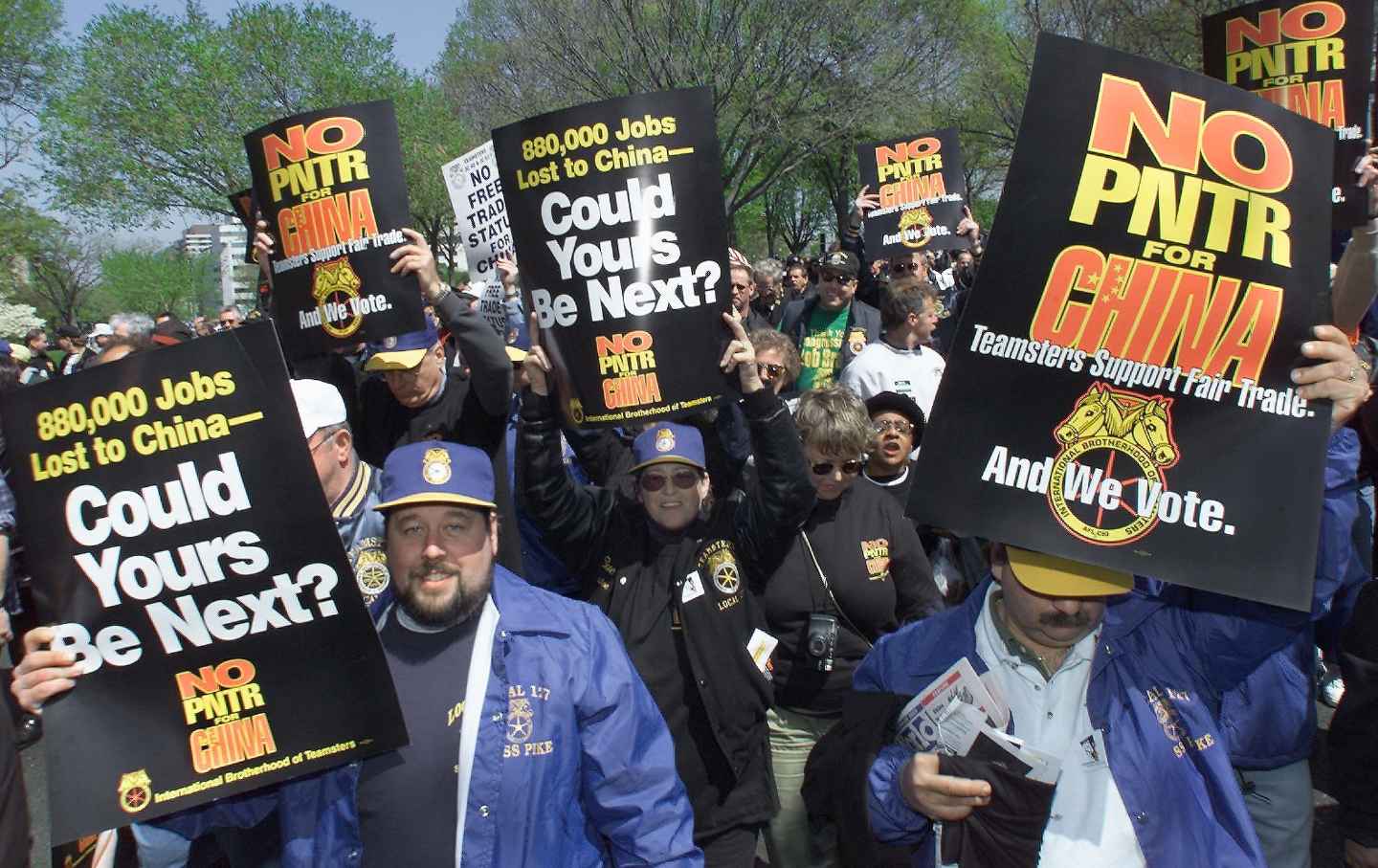
Thousands of Teamsters march on the US Capitol on April 12, 2000, in Washington, DC, to join up with AFL-CIO union members and protest the US government’s proposal for normal trade relations with China.
(Paul J. Richards / AFP via Getty Images)On the eve of Donald Trump’s inauguration, United Auto Workers (UAW) president Shawn Fain—arguably the most important labor leader in the US today—declared that his union was “ready to work with Trump.” Fain’s conciliation rested on one key Trump policy: tariffs. While tariffs have adversely affected the livelihood of the working class time and again, Fain believes that they are a boon for American, Mexican, and Canadian workers alike.
There was a conspicuous omission in Fain’s pronouncements about the tariffs: China, the prime target of each round of Trump’s tariffs. However, in a later interview with The Lever, Fain “applauded” both the Trump and Biden administrations’ tariffs on China, including Biden’s increase of tariffs on electric vehicles to 100 percent last year, because of “national security.” This rhetoric aligns with that of other labor leaders. Teamsters president Sean O’Brien, speaking to United Airlines maintenance technicians in March, condemned the company for “send[ing] our members’ jobs to communist China.” A social media graphic released by the Teamsters asked, “Would you trust China with aircraft repairs? United Airlines does.” AFL-CIO president Liz Shuler has been lobbying both the Biden and Trump administrations to increase tariffs on China to limit “unfairly traded products” to “advance national and economic security.”
While labor leaders have been careful to distance themselves from Trump’s latest frenzy of tariffs on all countries, the specter of China-bashing continues to haunt their defense of strategic tariffs. American Federation of Teachers president Randi Weingarten echoed Fain, saying that tariffs should be reserved for “particular countries…that violate labor rights or that subsidize their export industries.”
Protectionism against China has unified American labor leaders and politicians around economic policy in recent years. Even before tariffs as high as 145 percent became reality, the US-China trade war dramatically reshaped the global auto industry, and Chinese auto workers have borne the brunt of the US’s tariffs. Trump’s escalation with China opens more room for politicians, including Democrats, to promote anti-China policies; a day after Trump’s announcement of 125 percent tariffs on China, freshman Michigan Senator Elissa Slotkin introduced a bill preventing Chinese vehicles from entering the United States. “I will lay down on the border to keep Chinese vehicles from entering the U.S. market. This is my first bill I’m introducing in the Senate, and it’s for a reason,” Slotkin said.
Sinophobia, in other words, is a fundamental part of this economic protectionism. It defines the far right’s political platform, and articulates its common ground with the Democratic Party.
American labor’s Sinophobia also has its own long history. The earliest national labor organizations in the US, from the Knights of Labor to the American Federation of Labor (AFL), stood united in seeking to exclude Chinese immigrant labor. They saw Chinese workers as antagonistic to American ones by default. Now, with China’s rise on the global stage and the decline of American workers’ fortunes through decades of neoliberalism, the rationale remains the same: China is “unfairly” undercutting competition by offering cheap goods and labor, thus benefiting monopoly interests. This poses an existential threat not only to organized labor but also to domestic producers. This false logic disregards that attacks on labor stem from the capitalist system itself. Protectionist measures by capitalist governments, like tariffs or restrictions on immigration, would not solve them.
As in the 19th century, American labor has felt the decimating effects of capitalism’s transformation into even more exploitative stages, while mistaking another symptom for its cause. Sinophobia has ultimately compelled labor into Faustian alliances with its capitalist class rather than pushing it to become an independent political force that can disrupt monopoly capitalism.
There is an alternate path. It lies in firmly rejecting economic nationalism and recognizing global class oppression under capitalism as the source of labor’s ills everywhere. Rank-and-file workers across unions can fight for this alternative by uniting to challenge their leaders’ endorsement of Trump’s trade policies. Only by staking out an independent political path can American labor defend itself from the unfolding far-right offensive.
In the late 19th century, American labor was at the helm of the movement to block Chinese immigration. While Sinophobic attitudes among workers have long existed, Chinese exclusion did not congeal into a national political movement until the late 1860s, just as American capitalism first developed in full force. The massive expansion of the railroad system after the end of the Civil War laid the foundation for capitalist development in the United States. Low-cost, imported Chinese workers were the main source of labor for this endeavor. They were willing to work long hours for low pay in dangerous conditions. American workers, particularly those fighting for an eight-hour day, eventually viewed this as a threat to their demands for better labor conditions. These “eight-hour men” became the ideological backbone of the efforts to exclude Chinese labor.
Ira Steward, from Boston’s Machinists and Blacksmiths’ Union, was the foremost national leader in the campaign for an eight-hour day. He also developed an extensive theory of why Chinese people fundamentally threatened the interests of American workers. In a pamphlet called “The Power of the Cheaper Over the Dearer,” Steward said that the capacity to undersell “conquers everything,” a trait most embodied by the “half civilization” of China. Though he acknowledged that the expansion of capitalist markets across the world plays a role in amplifying “the power of the cheapest,” he warned that Chinese workers were particularly dangerous because they were “narrow and superstitious, just the condition to invite the iron-handed despotism of an Emperor.”
What Steward saw as the inherent propensity of Chinese society to accept lower standards makes China uniquely destructive for other nations. Steward contended that “the poor and ignorant heathens in far off lands” who have little means to “raise armies,” actually do “infinitely more harm” to more developed countries, since “they can and do work for wages that undersell ours.”
Steward’s analysis was shared by many labor (and even socialist) contemporaries. Denis Kearney, one of the most virulently anti-Chinese labor leaders in the 1870s, said that “a Chinaman will live on rice and rats. They will sleep one hundred in a room that one white man wants for his wife and family.” In a speech to shoemakers in Lynn, Massachusetts (who led the largest strike in US history before the Civil War), he connected “the Chinese cheap labor question” to “the interest of thieving monopolists.” This attitude provided ideological justification for American workers to team up with their bosses to attack Chinese labor, through bodies like the California Anti-Chinese Non-Partisan Association. Historian Alexander Saxton observes that while American workers and producers collaborated to fight what they saw as an alliance between monopolists and Chinese workers, “when they struck back, they generally struck at the Chinese,” not the bosses.
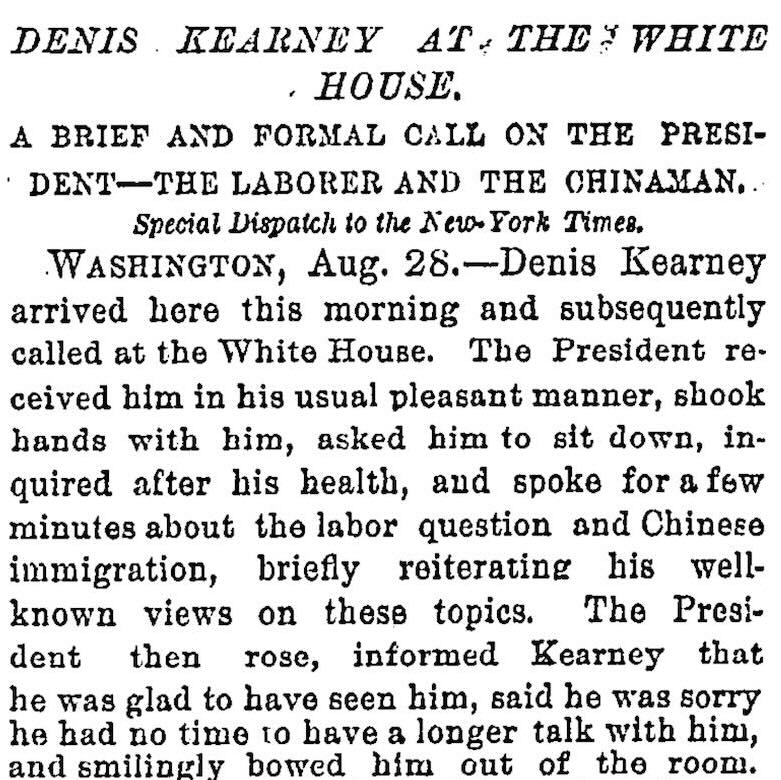
Anti-Chinese labor associations flourished precisely when American capitalism began transitioning into a system dominated by monopolies. Many labor gains were erased as economic panics of new magnitudes, as in 1873, multiplied. The abysmal conditions of Chinese labor were among the many atrocities wrought by the growth of monopoly capital.
But why was Sinophobia, in particular, perceived by American labor as the root of these ills? The problem is that, as literary critic Colleen Lye puts it, the rhetoric of “Oriental despotism [was used] by American socialists and agrarian reformers alike to elaborate the decadence of monopoly capitalism.” Such labor and other social reformers considered China, in Lye’s terms, a “paradigmatic failure of ‘Oriental society’ to evolve toward capitalism.” They mistakenly identified Chinese society as an extension of monopoly interests, rather than recognizing their shared plight with Chinese workers caused by monopoly capital. Sinophobia led labor reformers to misdiagnose monopolies as a regression from capitalist development, rather than capitalism’s logical development.
Chinese labor was thus seen as a vestige of a backward past, arresting America’s march toward both capitalist and socialist modernity. This analytical error led to class collaboration between American labor leaders and producers. Without an adequate understanding of monopoly capitalism, labor was vulnerable to further opportunistic turns when monopolies began offering concessions, while holding fast to its chauvinism. When monopolies courted AFL leaders with benefits for white skilled workers in the 1890s, the labor bureaucracy quickly reconciled with them. In contrast, the Chinese still had little to offer to assuage labor’s racialized economic fears.
By the Cold War, militant labor movements that arose in the 1930s had been demobilized and institutionalized within the state. Labor leaders like AFL-CIO’s George Meany were often more hawkish than even their peers in the CIA. For them, China’s Communist revolution in 1949 meant that China was once again an economic threat to free trade and American workers, coupled with growing political might in a new expression of “Oriental despotism.” This specific aversion to China has run deep enough that it became salient even during the anti-Japanese hysteria in the 1980s, upon the growth of Japan’s automobile industry. In 1982, the two white autoworkers who mistook the Chinese American Vincent Chin for being Japanese and murdered him called him a “chink” and a “Chinaman.”
The eight-hour men’s critique of Chinese underselling was salient again for American labor in the 1990s, when hundreds of millions of low-paid Chinese workers flooded global markets upon the Chinese state’s new participation in the world economy. China’s shift toward market reforms saved global capitalism from a stagnating rate of growth. This new “world’s factory” helped revive conditions for capitalists to regain profits. But for American labor, China’s rise caused another crisis for domestic manufacturing, already being decimated by de-industrialization under neoliberalism.
Again, labor’s target was off. Job opportunities in America were not simply “stolen” by Chinese workers. The new jobs that appeared in China were qualitatively different. They were designed to be low-paid to accommodate capitalist regimes and firms’ new needs. This reconfiguration was the result of the collusion between the US government, the Chinese government, and US corporations.
In 2000, Hong Kong anti-globalization activist Sze Pang Cheung argued that trade sanctions would not reverse this exploitation. They would only prop up the power of stronger countries. They would create a double standard, as more powerful countries would be the ones enforcing the sanctions while being able to evade their own violations. Sze advocates delinking our defense of global labor standards from trade sanctions that serve ruling elites while throwing some workers under the bus.
American labor could have united with Chinese workers to strengthen global labor protections. But such internationalist perspectives were marginalized by nationalist ones. In the 2000s, an alliance of labor and domestic producers, represented by groups like the Alliance for American Manufacturing (AMM), was at the forefront of challenging China’s entry into the World Trade Organization. The resurgence of economic nationalism led to American labor misdiagnosing China as the problem’s cause, which is actually the machinations of global ruling elites.
Labor’s rhetoric on China preempted and aligned with what far-right economist and current White House trade adviser Peter Navarro, in his 2011 book Death by China, called China’s “weapons of job destruction,” which, he wrote, “have totally shredded the principles of both free markets and free trade.” Such anti-China measures seemed futile then during the heyday of the US-China rapprochement on globalization. But this cross-class alliance against China became more productive for the ruling class as relations began to fray in Trump’s first term. American labor’s Sinophobia has become newly useful for the capitalist system in this new transitional era, in search of better conditions to maintain profitability. The ruling elites’ answer is to recover economic nationalism while perpetuating the worst excesses of neoliberal austerity. Trump’s tariffs this year are the brainchild of Navarro, and China remains his central focus.
Labor’s advocacy of higher tariffs against China suited this nationalist program. The AMM was described in March as “the most vocal outside intellectual support” for Trump’s trade policy. American labor leaders’ common refrain today blends Steward’s economic rationale with Meany’s anti-communism, best represented by Shuler’s charge that China’s authoritarian system compels unfair trade practices that disrupt free competition. For these labor leaders, China’s threat is also magnified because the country’s growing military and economic strength now accompanies its capacity to violate fair trade laws just like the US.
China has imposed more and more of its criteria on global trade as it asserts its own hegemony in the world economic order. It has pressured developing nations in its orbit to support its revanchist ambitions in Taiwan, discouraging them from trading with the island nation. Like the US, China has also exhibited growing belligerence in the South China Sea, violating the sovereignty of countries like the Philippines. But such behavior is by no means unique. Under capitalism, advanced capitalist countries are compelled to grow and protect their markets, and defend their spheres of influence through military or economic means.
And yet, Steward’s specter persists. In February, the presidents of four major unions—the United Steelworkers, the International Brotherhood of Electrical Workers, the International Brotherhood of Boilermakers, and the International Association of Machinists and Aerospace Workers—called on Trump to impose even more tariffs on China to save America’s shipbuilding industry. They fault China’s government subsidies to its own shipbuilding industry as “predatory,” suggesting that such actions artificially distort competition to harm American workers.
But state subsidies to boost production are part of all capitalist economies. In the meantime, the Trump administration has blatantly flouted global trade agreements on a larger scale with its tariffs and other policies. Despite the transformation of China’s place in the global economy, Trump and labor’s China-bashing logic remains strikingly consistent with Steward’s belief over a century ago: that China can dominate the world by distorting free competition.
Trump has now given these labor leaders much more than they asked for. But we must not lose sight of the key thread in this chaotic barrage. Earlier in April, Navarro explicitly said that the tariffs are meant to “apply pressure on other countries, including Cambodia, Mexico and Vietnam, not to trade with China if they want to continue exporting to the US.” Trump was willing to pause the raised tariffs on all countries while heightening the tariffs on China. The goal of escalating inter-imperialist rivalry with China conditions Trump’s global economic maneuvers. And the long-honed Sinophobia by an alliance of American labor and capital has provided a strong impetus to this scheme.
Once again, Sinophobia also ensures that no unified independent labor movement would arise in America to raise an effective political challenge to neoliberalism. The chauvinism now serves the interests of a declining empire, increasingly intransigent as it struggles to maintain its global power.
The perils of labor’s compromise with the far right are also greater today because the far right can only secure its strength by disciplining labor, either by smashing its organizations or co-opting them. Despite Fain’s later addendum that broad tariffs are “reckless,” his acceptance of economic nationalism already cedes significant ground to the right. We should determine how we negotiate with our adversaries based on what best empowers workers to maximize their bargaining power. Policies that rely on capitalist competition that harm workers at home and abroad do not. Trump’s tariffs have already led Stellantis to lay off over 900 American workers, while pausing production in Canadian and Mexican plants. General Motors is increasing production, only to hire underpaid temporary workers to staff it.
Even more dangerously, compromising with Trump on tariffs is not simply equivalent to unions’ negotiating deals with bosses to consolidate movement gains. Trump’s tariffs are inextricable from a broader political project consciously devoted to dismantling working-class organizations wholesale. Detaching the question of politics from labor movements further strips away labor’s capacity to defend itself from the far right’s onslaught. The UAW leadership deludes itself by thinking that labor could reap gains from providing a left cover to the far right’s core program.
Popular
“swipe left below to view more authors”Swipe →Fain even promotes American manufacturing as “key to national security,” since “when you can’t produce anything, you’re opening yourself up for attack from anyone.” He nostalgically recalls the days of World War II, when auto plants used excess capacity “to build bombers, to build tanks, to build jeeps…that became the arsenal of democracy…to defend ourselves.” This may be more sound when the US was fighting the Nazis, but saying this without qualification today means nothing less than endorsing America’s imperial ambitions.
The argument that nations abroad have eviscerated American workers by undercutting their jobs and living standards provides powerful ideological ammunition for the far right. Workers who buy into such myths could find common ground with Trumpism. It affords workers a mentality that their victimhood is the cause of foreign national threats, rather than a systemic problem they share with Chinese and other workers. And Trump’s political agenda would profit from a labor constituency that aligns with the chief tenets in his ideological horizon.
There are alternative measures for labor to reject both neoliberalism and economic nationalism. Tobita Chow suggests that we could organize around “shared corporate targets,” like Apple (or Tesla), which have supply chains connecting the two countries and harming American and Chinese workers alike. Michael Galant recommends calling on workers to demand that international labor bodies like the International Labor Organization adopt a global minimum wage. Andrew Elrod calls for targeted policies to limit corporate profits, including “banning stock buybacks, taxing excess profits, and raising individual income taxes on senior managers [to] force corporations to reinvest their earnings.” These give more space for workers everywhere to organize, rather than privileging the rights of some above others. But organizing around such policies requires a break from all capitalist interests and the two-party establishment.
Fain’s olive branch to Trump on trade is all the more concerning, as it shows weakness even in the leading labor leader today in the face of the far right. But while Fain may symbolize the labor resurgence in recent years, its real power lies in rank-and-file workers. Some of them are now paving the way for a different type of labor politics—one that draws a sharp line from the designs of American ruling elites. The UAW members at Columbia University and the University of California have pushed their union to tie labor repression to their workplaces’ complicity with the US’ imperial vision abroad.
While Fain is publicly harmonizing with Trump on trade policy, Columbia’s rank-and-file union members are being fired and kidnapped by the state for calling out their workplace’s complicity in Israel’s genocide of Palestinians. The heroic struggles of these rank-and-file workers model a class politics grounded on working-class solidarity and internationalism. To Fain’s credit, in his latest livestream to UAW members, he powerfully articulated that union members facing deportation, from graduate workers speaking out against Israel’s war in Palestine to metalworkers arbitrarily sent to Salvadoran prisons, share a common struggle. But this messaging is muddled without a clear stance against nationalism in all its forms.
This upturn of rank-and-file militancy across American unions for Palestine is the positive alternative to labor leaders’ concessions to economic nationalism that we need. The left must continue to defend their ranks, and mobilize them to challenge their leaders’ conciliation with the nationalism of the far right. Sinophobia is a central node that unifies the two-party system and the labor bureaucracy around economic nationalism today. It binds organized labor to the capitalist class at a moment when a break is urgently needed. It dangerously fosters the chauvinism of American workers rather than empowering them to identify global class oppression as the source of their ills—and the need to build independent political demands and institutions to fight it.
Observing the rapid growth of fascism in Germany in 1931, the communist revolutionary Leon Trotsky remarked that socialists must encourage workers—especially those in bureaucratic unions and other organizations—to “test the value of their organizations and leaders at this time, when it is a matter of life and death for the working class.” This same principle applies today: Workers must organize against our leaders’ compromise with all forms of chauvinism to save the future of American labor.
More from The Nation
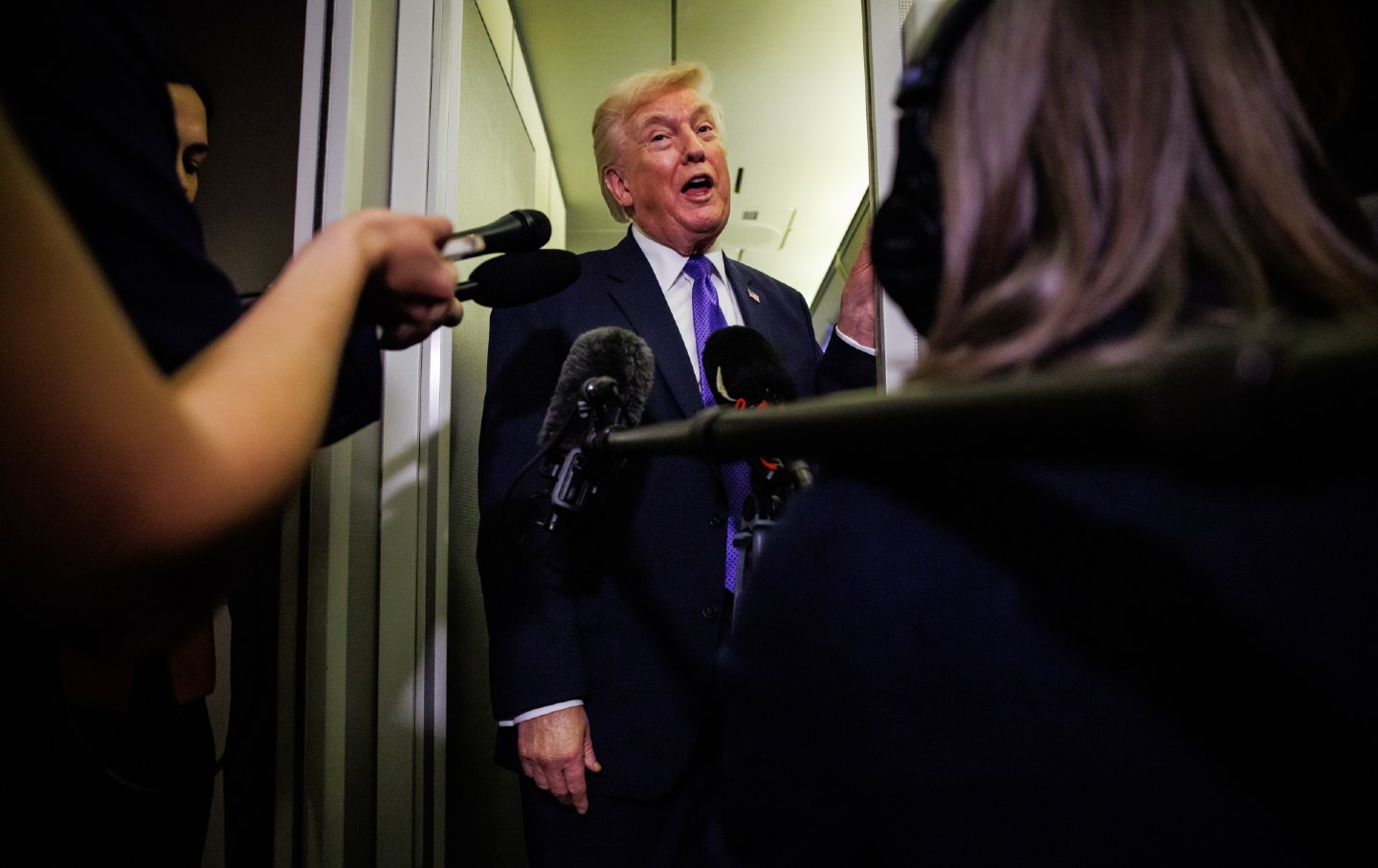
Don’t Let Trump Fool You. The Economy Is Bad, and He Is to Blame. Don’t Let Trump Fool You. The Economy Is Bad, and He Is to Blame.
The Trump administration’s efforts to distract from the bad economy just divert attention from one dumpster fire to another.

Why Elon Musk’s Latest Mega Merger Is Little More than Vaporware Why Elon Musk’s Latest Mega Merger Is Little More than Vaporware
The tech mogul and would-be space pioneer is mashing up his properties once more in a deal that's unlikely to achieve escape velocity .

The Farmland Revolt The Farmland Revolt
America’s farmers are fuming over Trump’s tariffs. Democrats need to channel their anger.
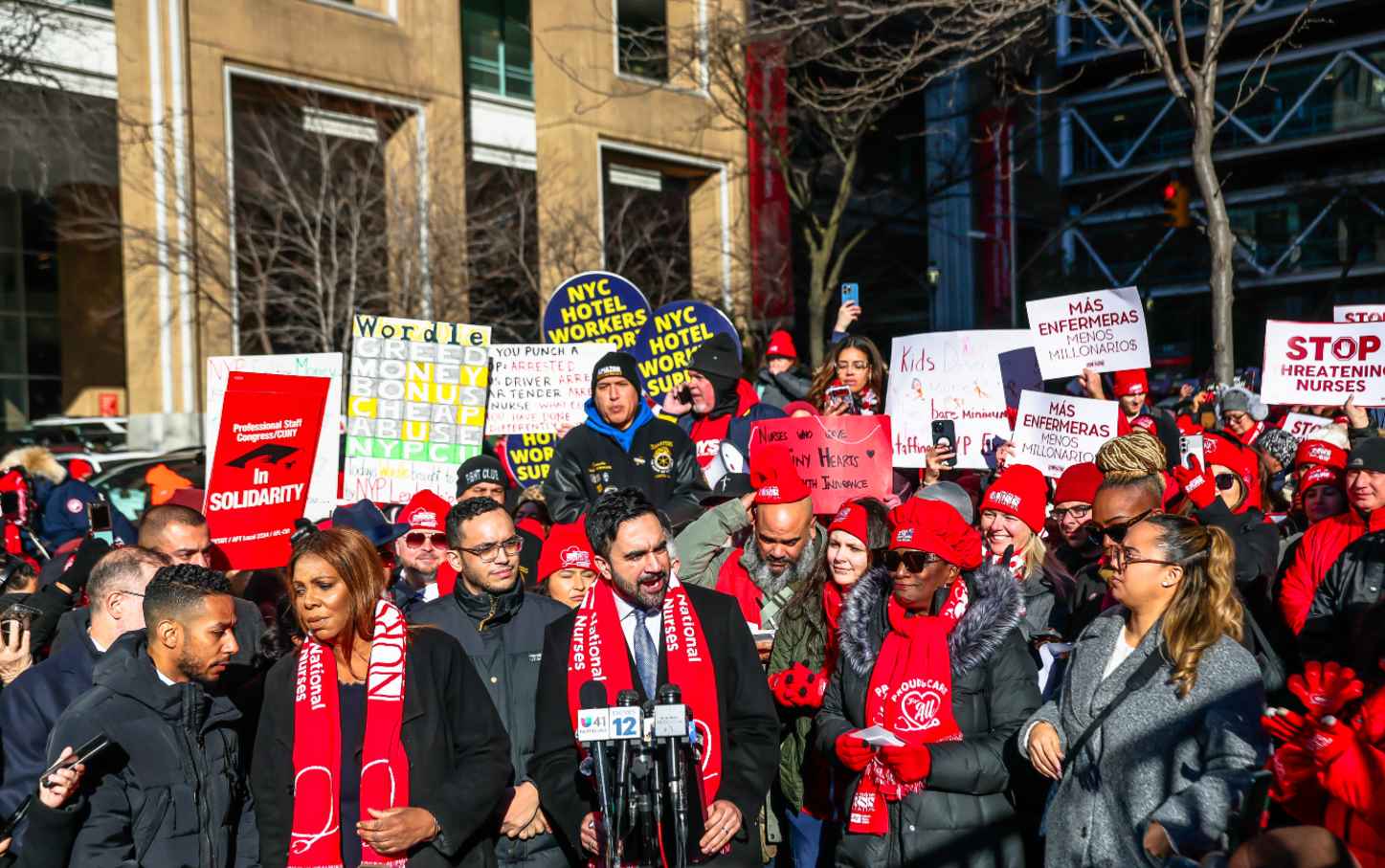
We Need Radical Abundance We Need Radical Abundance
If we want abundance we have to ask, an abundance of what exactly, and produced under what economic logic?
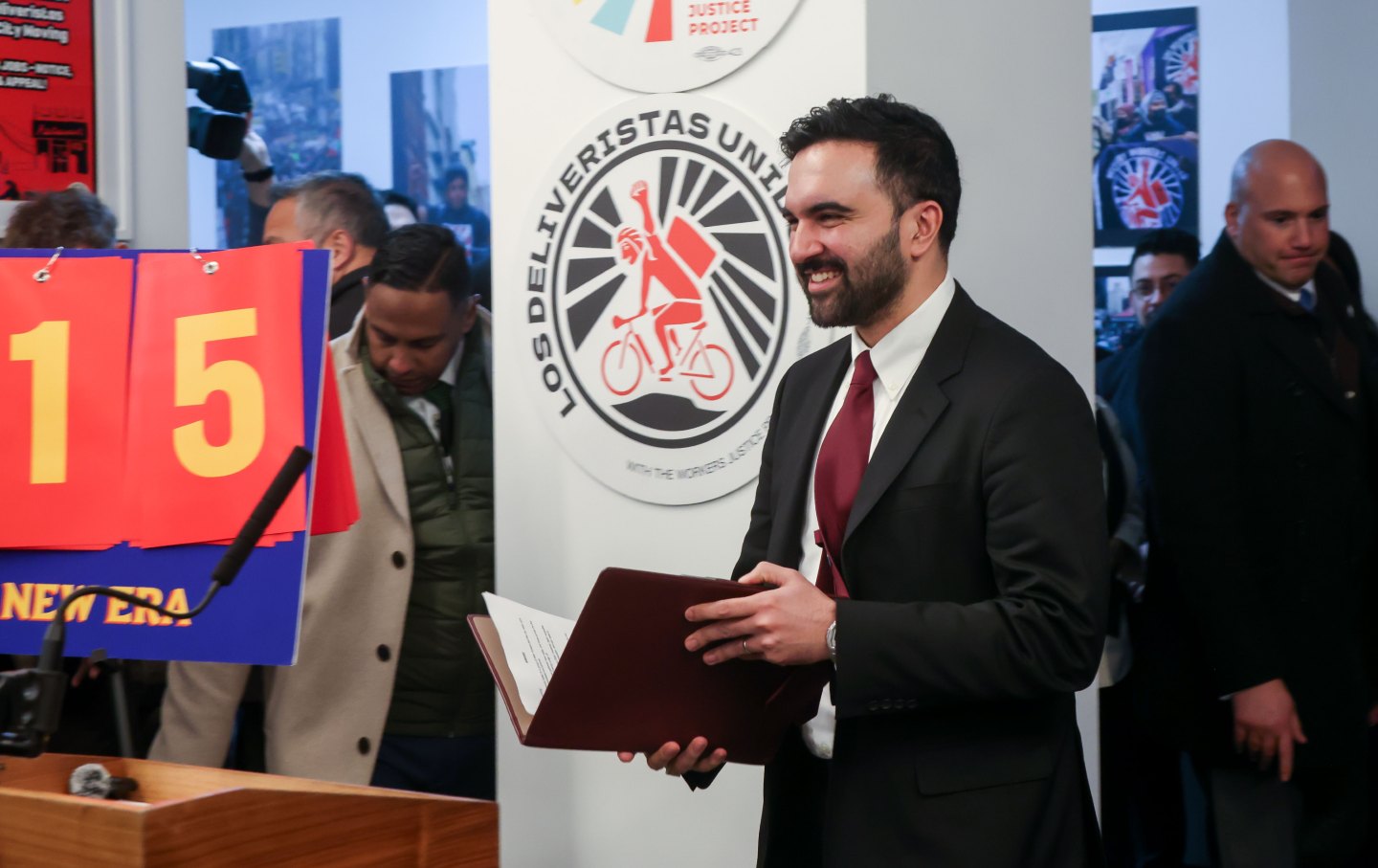
Zohran Mamdani Takes on the Gig Economy’s Wage Thieves Zohran Mamdani Takes on the Gig Economy’s Wage Thieves
New York City is suing a delivery app for stealing workers’ pay—signaling that under Mamdani, gig companies can no longer break the law with impunity.
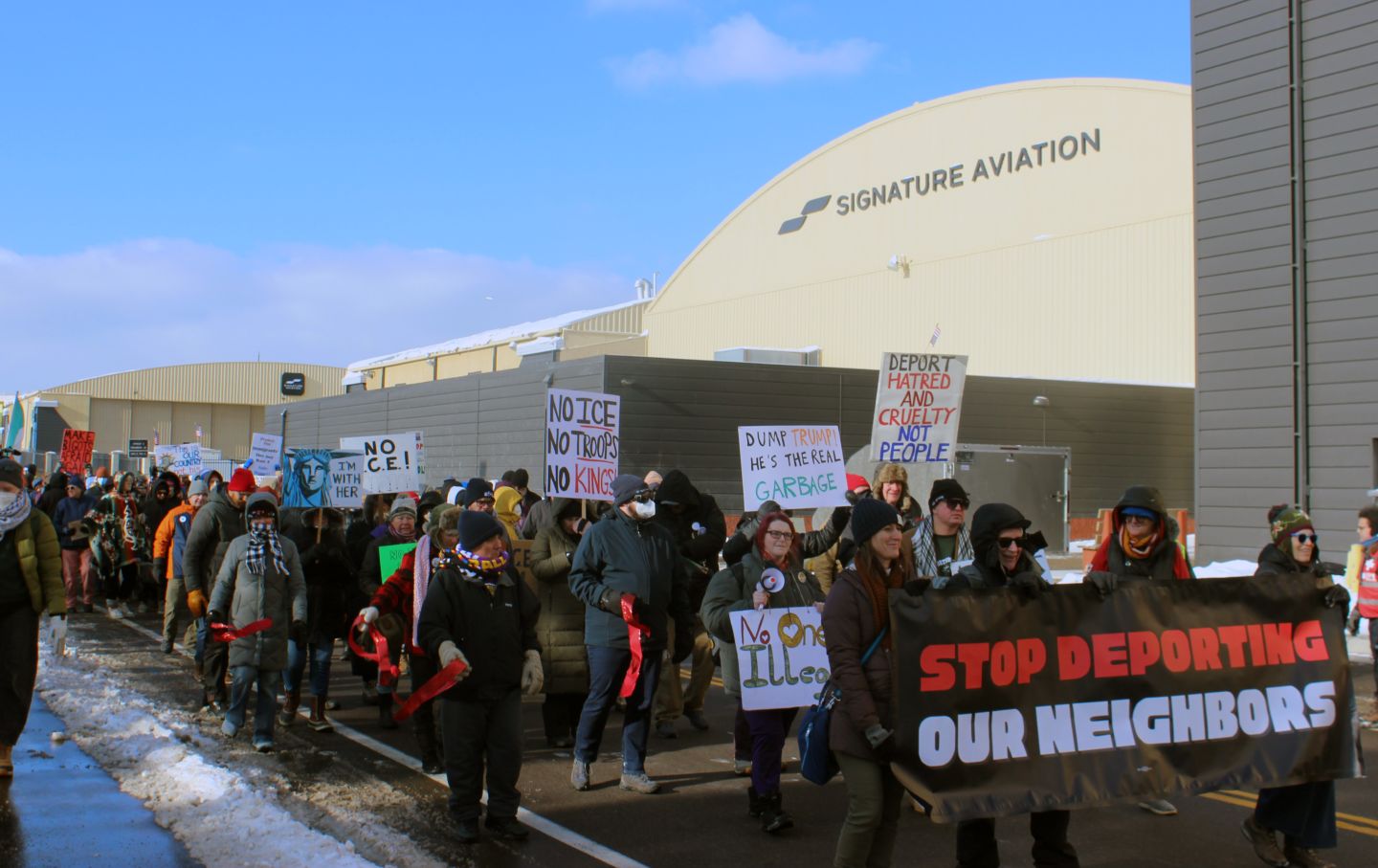
How Trump’s Immigration Crackdown Chills Organizing and Erodes Conditions for All Workers How Trump’s Immigration Crackdown Chills Organizing and Erodes Conditions for All Workers
When one group of workers is terrorized or disappeared, it threatens all workers’ ability to fight for their labor rights.


